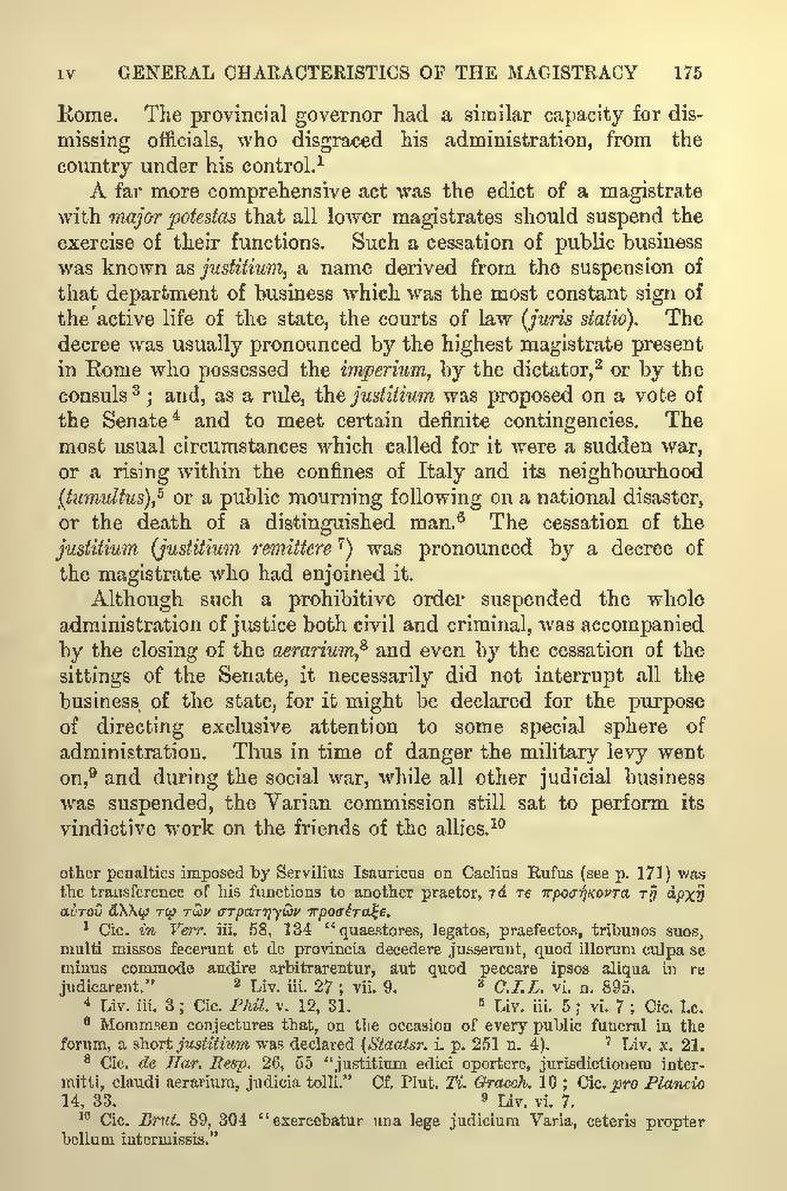Rome. The provincial governor had a similar capacity for dismissing officials, who disgraced his administration, from the country under his control.[1]
A far more comprehensive act was the edict of a magistrate with major potestas that all lower magistrates should suspend the exercise of their functions. Such a cessation of public business was known as justitium, a name derived from the suspension of that department of business which was the most constant sign of the active life of the state, the courts of law (juris statio). The decree was usually pronounced by the highest magistrate present in Rome who possessed the imperium, by the dictator,[2] or by the consuls[3]; and, as a rule, the justitium was proposed on a vote of the Senate[4] and to meet certain definite contingencies. The most usual circumstances which called for it were a sudden war, or a rising within the confines of Italy and its neighbourhood (tumultus),[5] or a public mourning following on a national disaster, or the death of a distinguished man.[6] The cessation of the justitium (justitium remittere[7]) was pronounced by a decree of the magistrate who had enjoined it.
Although such a prohibitive order suspended the whole administration of justice both civil and criminal, was accompanied by the closing of the aerarium,[8] and even by the cessation of the sittings of the Senate, it necessarily did not interrupt all the business of the state, for it might be declared for the purpose of directing exclusive attention to some special sphere of administration. Thus in time of danger the military levy went on,[9] and during the social war, while all other judicial business was suspended, the Varian commission still sat to perform its vindictive work on the friends of the allies.[10]
- [Footnote: other penalties imposed by Servilius Isauricus on Caelius Rufus (see p. 171) was
the transference of his functions to another praetor, [Greek: ta te prosêkonta tê archê autou allô tô tôn stratêgôn prosetaxe].]
- ↑ Cic. in Verr. iii. 58, 134 "quaestores, legates, praefectos, tribunos suos, multi missos fecerunt et de provincia decedere jusserunt, quod illorum culpa se minus commode audire arbitrarentur, aut quod peccare ipsos aliqua in re judicarent."
- ↑ Liv. iii. 27; vii. 9.
- ↑ C.I.L. vi. n. 895.
- ↑ Liv. iii. 3; Cic. Phil. v. 12, 31.
- ↑ Liv. iii. 5; vi. 7; Cic. l.c.
- ↑ Mommsen conjectures that, on the occasion of every public funeral in the forum, a short justitium was declared (Staatsr. i. p. 251 n. 4).
- ↑ Liv. x. 21.
- ↑ Cic. de Har. Resp. 26, 55 "justitium edici oportere, jurisdictionem intermitti, claudi aerarium, judicia tolli." Cf. Plut. Ti. Gracch. 10; Cic. pro Plancio 14, 33.
- ↑ Liv. vi 7.
